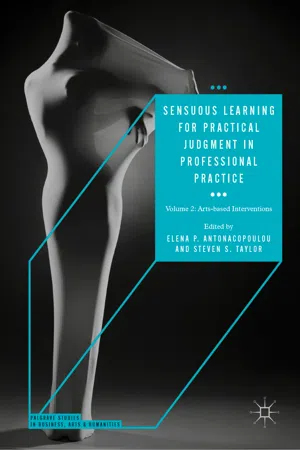
Sensuous Learning for Practical Judgment in Professional Practice
Volume 2: Arts-based Interventions
- English
- ePUB (mobile friendly)
- Available on iOS & Android
Sensuous Learning for Practical Judgment in Professional Practice
Volume 2: Arts-based Interventions
About this book
The second volume of this ground-breaking book critically examines the effect of arts-based methods in combination as arts-based interventions in improving professional practice, from deinstitutionalization to the counteraction of destructive leadership. Taking a 'human-centred' approach, it delivers an insightful account of what these approaches do differently to achieve a new mode of learning – 'sensuous learning' – that cultivates professional judgment to serve the common good, simultaneously supporting personal and collective growth. The chapters present cutting edge examples of multiple ways arts-based interventions underpin learning arenas for expanding leadership and improving professional practice. The reflexivity cultivated through these learning arenas has the unique potential to improve professional practice, not merely by enhancing competence but also by cultivating character and conscience, which is central in making judgments that serve the common good. These benefits are relevant for professional practitioners sharpening the skills and behaviours needed in organisations, including creativity, diversity, imagination, and improvisation.
Tools to learn more effectively

Saving Books

Keyword Search

Annotating Text

Listen to it instead
Information
Sensuous Learning for Individuals, Communities and Organisations
Table of contents
- Cover
- Front Matter
- Arts-Based Interventions as Platforms for Sensuous Organisational Learning: An Introduction
- Sensuous Learning for Individuals, Communities and Organisations
- Using Applied Improvisation for Organizational Learning in the Red Cross Red Crescent Climate Centre
- Using Performance to Foster Inherent ‘Poetic Potential’ in Nordic Schools
- Using Parody in Transforming a Healthcare Organisation in Australia
- Using Narratives and Portraits to Foster Reflexivity and Learning from Experience in Healthcare Organizations in Italy and Norway
- Using Balloons to Co-create Welfare in the Danish Health Care Sector
- Using Shibboleth to Support Leadership Development Through an ‘Aesthemetic’ Approach in Sweden
- Using Aesthetic Dramas to Transform Leadership Practice in the Public Sector in Denmark
- Using Student-Led Arts-Based Methods in Finnish Higher Education to Foster Leadership for Change
- Using Kaleidoscopic Pedagogy to Foster Critically Reflective Learning About Management and Leadership
- Using Kinaesthetic Exertion to Engender Team Psychological Safety in UK Higher Education
- Arts-Based Interventions for Sensuous Organisational Learning: Extensions and Possibilities
- Back Matter
Frequently asked questions
- Essential is ideal for learners and professionals who enjoy exploring a wide range of subjects. Access the Essential Library with 800,000+ trusted titles and best-sellers across business, personal growth, and the humanities. Includes unlimited reading time and Standard Read Aloud voice.
- Complete: Perfect for advanced learners and researchers needing full, unrestricted access. Unlock 1.4M+ books across hundreds of subjects, including academic and specialized titles. The Complete Plan also includes advanced features like Premium Read Aloud and Research Assistant.
Please note we cannot support devices running on iOS 13 and Android 7 or earlier. Learn more about using the app